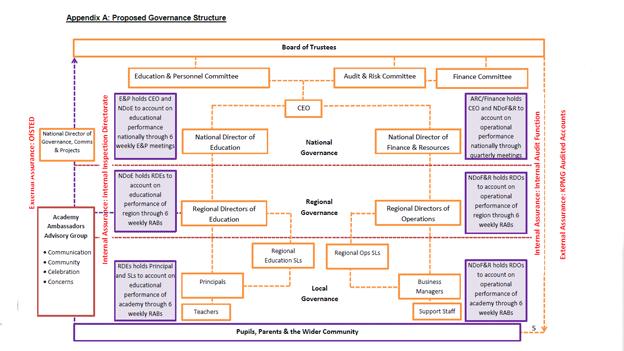Academy chain to scrap governing bodies
- Published

The E-ACT academy chain is removing its boards of governors
An academy chain is scrapping local governing bodies for its schools in England.
The E-ACT academy group says it will replace them with "academy ambassadorial advisory bodies".
These new bodies will "play a central role in celebrating the academy's achievements", E-ACT has told its school governors in a letter.
But governing bodies, with parental representatives, will no longer hold their local schools to account.
And the new advisory bodies will be chaired by someone appointed by the academy chain.
Publicly funded
The academy chain says it was about providing the "best possible education".
But a school governor described it as "authoritarian" and "repugnant".

The Department for Education says academy chains can decide how they want to administer their schools
The National Union of Teachers said removing local representatives was "undemocratic and sets a dangerous precedent".
The Department for Education did not say whether they approved or disapproved, saying it was up to academy chains to decide how to administer their schools and "we trust them to decide on the most appropriate arrangements for their trust".
E-ACT's 23 schools are spread across England, with clusters in places including the West Midlands, Buckinghamshire, Bristol, Yorkshire and the north west.
As an academy chain it receives public funding to operate schools, with accounts for the academic year ending in August 2014 showing an income of £135m.
If the E-ACT chain were to open free schools, it is understood that these would also not have local governing bodies.
Centralised system
A letter sent to governors tells them that the academy chain has decided to change its form of governance.
Instead of local school governing bodies, there will be a centralised process for monitoring standards.
There will be a single central governing body covering all schools in the group across the country, rather than governors at individual level.

A flowchart of the new accountability from board of trustees at the top to parents at the bottom
Governors often include representatives of parents, school staff, local businesses and local politicians.
The letter to governors says the academy chain would contact governing bodies "to discuss an appropriate transition date" and the replacement bodies would provide a different type of function, such as an "interface with the community".
And it invites current governors to move over to the new bodies, but these would no longer be involved in areas such as hiring senior staff and monitoring budgets and standards.
They would also not vote for the chair of their advisory body, who will be selected by E-ACT.
A governor in one of E-ACT's schools in the midlands said he was "shocked" at how governing bodies had been disbanded, which he described as "offensive and disrespectful to the people who freely volunteer their time to act as governors".
But Noran Flynn, chair of governors at Heartlands academy, said: "The changes being made by E-ACT will help volunteers to still be a core part of the scrutiny of the school's performance, but to do it alongside professionals in the field with the time to dedicate to the role."
This was challenged by another school governor, who said they had been told the new advisory bodies would have no decision making powers and would have no scrutiny role.
What makes this scrapping of the external monitoring by governors more controversial is that E-ACT itself has a troubled record.
In 2014, the academy chain lost control of 10 of its schools after Ofsted inspectors raised serious concerns about their performance.
Until July 2015, the chain was operating under a financial notice to improve, imposed by the Education Funding Agency.
A spokeswoman for E-ACT said the academy group had introduced "fundamental changes to how the organisation operates to ensure that every young person received the best possible education with us".
She added: "Part of this involves adopting a new governance model, in line with the Department for Education's guidance.
"We appreciate that change can be challenging for some, but we are committed to continuing to work closely with our governors and are encouraging each of them to take up posts in the newly-formed advisory bodies."
- Published25 February 2014

- Published17 May 2013
